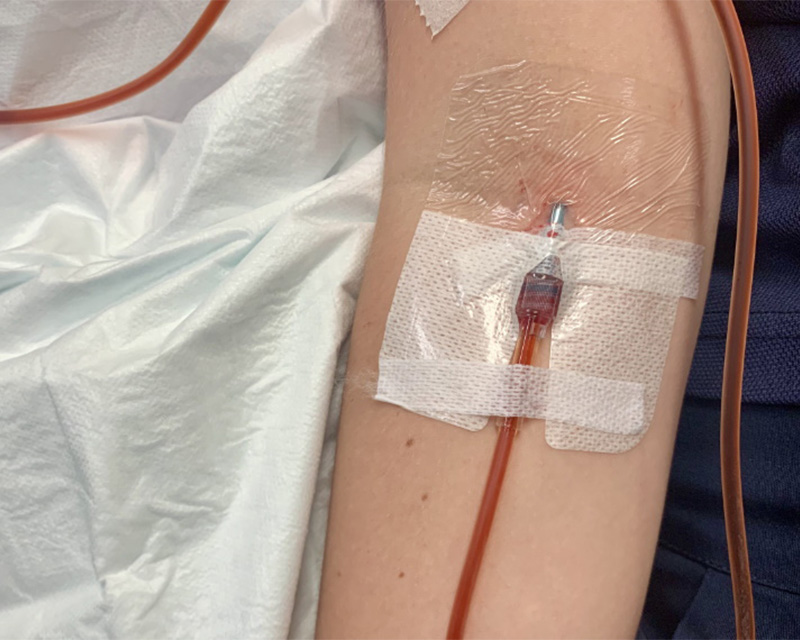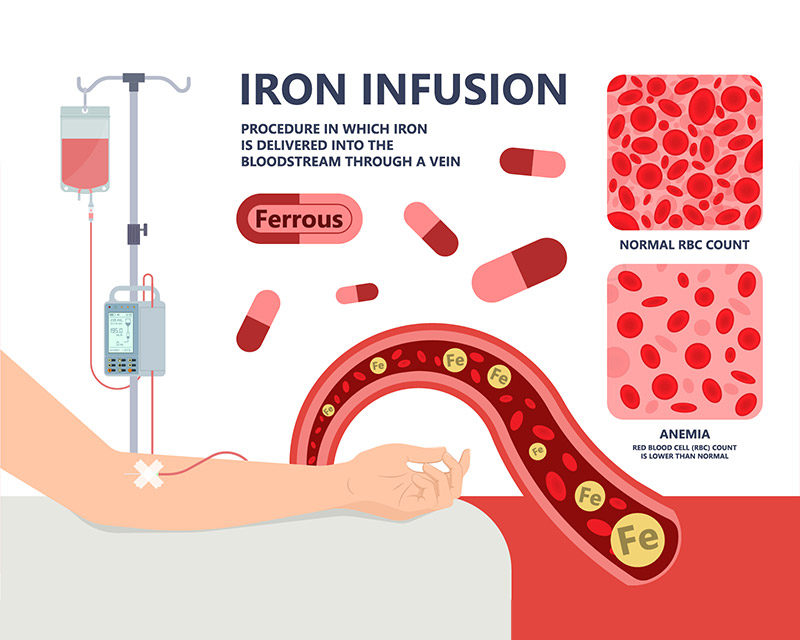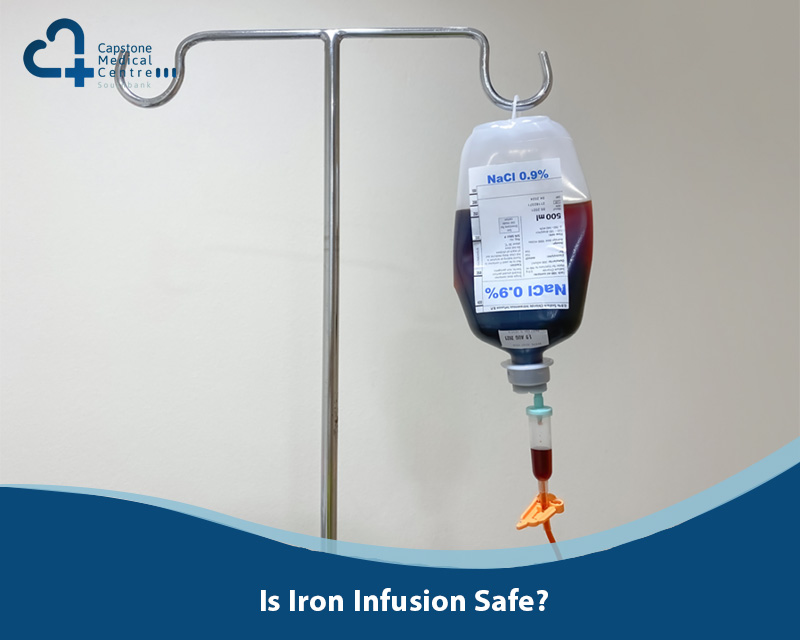Iron infusion, a procedure commonly performed at medical centres like Capstone Medical Centre, is a treatment designed to increase iron levels in the body. This is particularly important for individuals suffering from iron deficiency, a condition that can lead to symptoms such as fatigue, shortness of breath, and decreased immune function.
Iron infusions are generally considered safe and effective. They work by delivering iron directly into the bloodstream, bypassing the digestive system, and leading to a quicker and more efficient absorption of iron. This can be a game-changer for those who struggle with iron deficiency and have not seen improvements with oral iron supplements.
What is Iron Deficiency?
Iron deficiency anemia is a common type of anemia that occurs when your body doesn’t have enough iron. Iron is essential for producing hemoglobin, a protein in red blood cells that enables them to carry oxygen around the body. If your iron levels are low, your body may not be able to produce enough healthy oxygen-carrying red blood cells.
Iron deficiency anemia can be caused by a variety of factors, including:
- inadequate iron intake due to poor diet or restrictive diets,
- inflammatory bowel disease,
- or during pregnancy when iron stores may not meet the increase in blood volume.
Symptoms of iron deficiency can vary but may include:
- fatigue
- weakness
- pale skin
- chest pain
- dizziness
- cognitive problems
- cold hands and feet
- brittle nails
If left untreated, iron deficiency anemia can lead to serious health problems, like heart problems, as the heart needs to pump more blood to compensate for the lack of oxygen.
consult with a healthcare professional if you’re experiencing symptoms of iron deficiency. They can guide effective treatments, which may include iron infusions. The following sections will explore iron infusions’ safety, benefits, and side effects more deeply.
Might be interested: What are the Common types of anemia?
What is an Iron Infusion?

An iron infusion is a medical procedure that involves injecting iron directly into the bloodstream.
This treatment is typically used to address severe iron deficiency, a condition that occurs when the body lacks sufficient iron to produce the necessary amount of red blood cells. Iron is a crucial element in the production of hemoglobin, a protein in red blood cells that carries oxygen throughout the body.
When iron levels are low, the body may not be able to produce enough healthy red blood cells, leading to iron deficiency anemia.
When is it recommended?
Iron infusions are often recommended when oral iron supplements are ineffective or cause side effects. They are also used when there is a need to quickly increase iron levels, such as in individuals with significant blood loss or those preparing for surgery.
The procedure is typically performed in a healthcare setting and takes about 15 to 30 minutes, although the entire appointment may last a couple of hours to allow for preparation and observation.
It’s important to note that while iron infusions can effectively treat iron deficiency, they are not a cure for the underlying causes of the deficiency. Therefore, it’s crucial to work with a healthcare provider to identify and address the root causes of your iron deficiency to prevent it from recurring.
Who are candidates for Iron Infusion

Chronic iron deficiency
Iron infusions can be beneficial treatments for various individuals. They are recommended primarily for patients with chronic iron deficiency, which includes individuals who consistently have a low iron level despite attempts to increase it through diet or oral iron supplements.
Chronic iron deficiency can lead to anemia, a condition characterised by fatigue, weakness, and a decreased ability to concentrate.
Untolerating oral iron supplements
Another group that may benefit is those who cannot tolerate oral iron supplements. Some individuals may experience side effects such as stomach upset, constipation, or nausea from oral iron supplements. Iron infusions can provide an alternative method of increasing iron levels without gastrointestinal side effects for these individuals.
Medical conditions
Iron infusions may also be recommended for individuals with certain medical conditions that affect iron absorption or cause increased iron loss. This includes individuals with inflammatory bowel disease, celiac disease, or those who have undergone gastric bypass surgery.
Pregnant women with iron deficiency
Lastly, can be beneficial for pregnant women who have iron deficiency. During pregnancy, the body’s demand for iron increases to support the growth and development of the fetus. If this demand is not met, it can lead to complications such as preterm birth or low birth weight.
Benefits of Iron Infusion

Iron infusions offer several benefits, particularly for individuals suffering from severe iron deficiency.
Relief of symptoms
One of the most immediate benefits is the relief of symptoms associated with iron deficiency, such as fatigue, weakness, and shortness of breath. By increasing the body’s iron levels, these symptoms can be significantly reduced, leading to an immediate improvement in the individual’s well-being.
Faster restore iron levels
Another significant benefit is the speed at which they can restore iron levels. Compared to oral supplements, iron infusions can increase the body’s iron levels much more quickly. This is because the iron is delivered directly into the bloodstream, bypassing the digestive system and leading to faster and more efficient absorption.
improved quality of life and energy levels
Finally, can lead to an improved quality of life and energy levels. Iron deficiency can significantly impact a person’s daily life, causing fatigue and reducing their ability to perform everyday tasks. By addressing iron deficiency, individuals often report feeling more energetic and capable, improving their quality of life.
If you’re considering this treatment, you can search for “iron infusion near me” to find healthcare providers like Capstone Medical Centre in your area who offer this service.
Your health is important, and addressing iron deficiency is crucial to maintaining your overall well-being.
Safety and Side Effects of Iron Infusion

Iron infusions are generally considered safe and are commonly used to treat severe iron deficiency. They are administered under the supervision of a healthcare professional, which allows for immediate response to any potential adverse reactions.
However, like any medical procedure, iron infusions do come with potential risks and side effects. These can range from mild to severe, although serious side effects are rare.
Common side effects include temporary changes in taste, flushing, headache, nausea, and dizziness. Some people may also experience reactions at the infusion site, such as redness, swelling, or pain.
In rare cases, individuals may have an allergic reaction to the iron infusion, which can cause symptoms such as hives, difficulty breathing, or chest pain. If you experience any of these symptoms during or after an iron infusion, it’s important to seek medical attention immediately.
It’s also worth noting that while iron infusions can effectively increase iron levels, they can sometimes lead to iron overload, which can be harmful. Therefore, a healthcare professional should closely monitor iron levels before and after the procedure.
procedure of Iron Infusion

The process of receiving an iron infusion typically involves several steps:
Preparation
Before the procedure, your healthcare provider will perform a blood test to confirm your iron levels and determine the appropriate dosage of iron. You may be advised to eat a light meal before your appointment and to stay well-hydrated.
Administration
The iron infusion is usually administered in a healthcare setting, such as a hospital or clinic. A healthcare professional inserts a small needle into a vein in your arm, and the iron is infused directly into your bloodstream over a period of about 15 to 30 minutes. The iron is mixed with a solution that helps your body absorb it.
Monitoring During the Procedure
A healthcare professional will monitor you for any adverse reactions throughout the infusion. This includes checking your blood pressure and heart rate and observing for any signs of an allergic reaction.
After the Procedure
Once the infusion is complete, you’ll be observed for a short period to ensure you don’t have any delayed reactions. You can usually return to your normal activities immediately after the procedure.
Follow-up
Your healthcare provider will schedule a follow-up appointment to check your iron levels and assess how well you’ve responded to the treatment. Depending on your individual needs, you may require additional infusions.
Recovery
some people may experience minor side effects such as fatigue or muscle aches for a few days following the procedure. It’s important to listen to your body and rest if needed.
You may not need further treatment if your iron levels have improved and your symptoms have lessened. However, additional iron infusions may be recommended if your iron levels remain low. It’s also possible that your healthcare provider will suggest changes to your diet or lifestyle to help maintain your iron levels and prevent future deficiencies.
Cost of Iron Infusion
The cost of an iron infusion session can vary widely, depending on several factors. These include the specific healthcare provider, the location of the service, and whether the patient has healthcare coverage that can offset some of the costs.
For more details, please Visit Capstone Medical Centre fees.
Choosing a Provider for Iron Infusion

When selecting a healthcare provider or infusion clinic, there are several factors to consider:
- Qualifications and Experience: Ensure that the healthcare provider is qualified and has experience in administering iron infusions. This can help ensure that the procedure is performed safely and effectively.
- Accreditation: Look for a clinic that is accredited by a recognised healthcare organisation. This can provide assurance that the clinic meets certain standards of care.
- Patient Reviews: Consider the experiences of other patients. Reviews and testimonials can provide insight into the quality of care provided by the clinic.
- Cost: The cost of the procedure can vary, so it’s important to understand what your insurance covers and what you’ll be expected to pay out-of-pocket.
- Location: Consider the clinic’s location. If you’re feeling unwell after the procedure, a long journey home may not be ideal. It is better to search for “Iron infusion clinic near me” to find the nearest address.
One provider that ticks all these boxes is Capstone Medical Centre. We are known for our high-quality care and experienced staff. We also offer a range of services, including iron infusions, and are committed to providing personalised care to meet the unique needs of each patient.
prioritising your health is essential, and making knowledgeable choices about your treatment alternatives is key to preserving your overall health.
Conclusion
In conclusion, iron infusions are a valuable treatment option for individuals suffering from severe iron deficiency. They offer a quick and efficient way to increase iron levels in the body, alleviating the symptoms of iron deficiency anemia and improving overall quality of life.
However, like any medical procedure, it comes with potential risks and side effects. Therefore, it’s crucial to discuss these with Capstone Medical Centre professionals before deciding on this treatment.
Sources:


1 thought on “Is Iron Infusion Safe? Benefits & Side Effects”
Comments are closed.